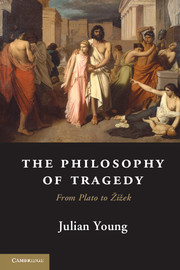Book contents
1 - Plato
Published online by Cambridge University Press: 05 June 2013
Summary
CULTURE WARS IN FOURTH-CENTURY ATHENS
The philosophy of tragedy begins with Plato (c. 428–347 BCE). Specifically it begins with Plato’s banning of tragic poetry, along with poetry of most other kinds, from the ideal state, the constitution of which he constructs in his most famous dialogue, the Republic. Before attending to his specific arguments for the ban, we need to attend to the motivation for this act of apparent barbarism.
Plato tells us pretty clearly what his motives are. He is, he says in the Republic’s Book X, prosecuting an ‘ancient quarrel between philosophy and poetry’ (607b). In describing the quarrel as ‘ancient’ he is referring to the critiques of poetry made by some of his pre-Socratic predecessors (in spite of their being themselves, inter alia, poets). Xenophanes (c. 570–475 BCE), for example, complains that ‘Homer and Hesiod ascribe to the gods whatever is infamy and reproach among men’ (Fragment 11), while Heraclitus (c. 535–475 BCE) observes, maliciously, that ‘[b]eing a polymath does not teach understanding: else Hesiod would have had it’ (Fragment 40).
- Type
- Chapter
- Information
- The Philosophy of TragedyFrom Plato to Žižek, pp. 3 - 20Publisher: Cambridge University PressPrint publication year: 2013

